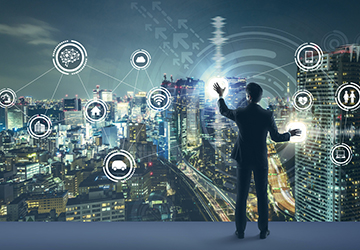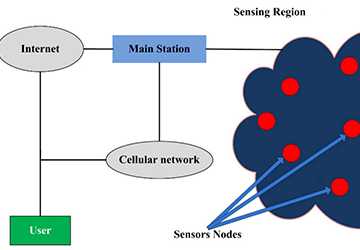Technological Innovations Powering the Sustainable Future of Smart Cities
The smart city paradigm has gained tremendous momentum in recent years as urban areas seek to become more efficient, sustainable, and livable. Integrating advanced technology into urban development is critical to achieving these goals. This presentation discusses innovative sustainable development projects for cities, the indispensability of technology in innovative urban development, and the potential for future smart city innovations to transform our metropolises.

The Need for Smart City Sustainable Development Projects
As the world's population continues its relentless march toward urbanization, cities face many challenges, including overpopulation, pollution, and resource allocation. Innovative urban sustainable development projects aim to alleviate these issues by implementing avant-garde solutions that promote environmental, economic, and social sustainability. These initiatives typically focus on:
- Reducing energy consumption through smart grids and renewable energy sources
- Improving waste management and recycling systems
- Expanding public transportation networks to reduce congestion and emissions
- Implementing environmentally friendly building practices and sustainable urban planning
Innovative City Development Cannot be Done Without Technology
Technology is critical to the transformation of traditional cities into smart cities. Technology for innovative urban development encompasses a host of innovations, including:
The Internet of Things (IoT): IoT devices collect and analyze data from various sources, allowing cities to monitor and manage resources more efficiently. For example, smart sensors can track air quality, traffic flow, and energy consumption in real-time, allowing you to make proactive decisions.
- Artificial Intelligence (AI): AI algorithms can optimize urban processes such as traffic management, energy distribution, and waste collection. By analyzing large data sets, AI can detect patterns and predict future trends, helping cities plan and adapt more effectively.
- Big Data Analytics: Examining large data sets can provide valuable insights into urban dynamics and support city planners' decision-making. Big Data analytics can identify areas for improvement, track the progress of intelligent city sustainability projects, and measure the impact of various initiatives.
- Blockchain Technology: Blockchain can increase transparency and security in urban management and service delivery.
Future Smart City Innovations
Future intelligent city innovations have the potential to revolutionize urban life and address the challenges facing modern cities. Essential areas of innovation are:
- Autonomous Vehicles: Self-driving cars and public transportation systems can ease traffic congestion, reduce emissions, and increase road safety. They are equipped with advanced sensors and artificial intelligence, allowing them to navigate complex urban environments with minimal human intervention.
- Smart Infrastructure: Future intelligent cities will be characterized by intelligent infrastructure that adapts to changing conditions and requirements. For example, smart grids can dynamically manage energy distribution based on real-time usage patterns, while intelligent water systems can detect leaks and optimize water use.
- Urban Agriculture: Vertical farms and rooftop gardens can help cities become more self-sufficient in food production. These innovations can reduce the carbon footprint of transporting food and provide city residents with fresh, locally-grown produce.
- Sustainable Buildings: Green building materials, energy-efficient designs, and integrated renewable energy systems are becoming the norm for innovative, sustainable city projects. Future towers will be designed to minimize environmental impact and promote residents' well-being.
- Improved Public Services: Technology will continue to improve public services such as healthcare, education, and emergency response.
The successful implementation of future smart city innovations depends on collaboration with governments, businesses, and citizens.
Challenges and Considerations
While the potential benefits of technology in innovative urban development are enormous, several challenges and considerations must be considered:
- Privacy and Security: The pervasive use of IoT devices and data analytics raises privacy and security concerns. Cities must take strong measures to protect sensitive information and ensure data is used ethically.
- Digital Divide: Modern technology can exacerbate inequality when certain population groups are marginalized. Efforts must ensure that all residents, regardless of socioeconomic status, can reap the benefits of smart city innovations.
- Regulatory and governance issues: Integrating new technologies into urban systems requires updated regulatory frameworks and governance models. Policymakers must address complex legal and ethical issues to create a supportive environment for innovative, sustainable city development projects.
- Financing and investment: Developing and deploying future intelligent city innovations will require significant financial investment.
Modern Water Management Systems
Water management is an essential aspect of innovative sustainable projects in cities. Future innovations in this area will focus on optimizing water consumption and ensuring sustainable supply through advanced technologies:
- Advanced water meters: Deploy advanced water meters that carefully monitor and report water usage in real-time, allowing for superior management and conservation measures.
- Automated leak detection: Sensors and IoT devices quickly detect inefficiencies and cracks in water supply systems.

Greywater recycling involves implementing and reusing greywater treatment systems for non-potable uses, reducing water demand.
These initiatives, driven by intelligent city development technologies, seek sustainable management of hydrological resources.
Innovative Waste Management and Recycling
Effective waste management is essential for sustainable development in cities. The city's innovative sustainability projects focus on using technology to improve waste collection, sorting and recycling methods:
- Smart waste bins: Smart waste bins with sensors monitor waste levels and optimize collection routes, thereby reducing fuel consumption and emissions.
- Automated sorting systems: Implement state-of-the-art sorting technology that uses artificial intelligence and robotics to separate recyclable materials from the waste stream carefully.
- Waste-to-Energy Solutions: Developing facilities that convert waste into energy through incineration or anaerobic digestion will reduce reliance on landfills.
Improving Urban Mobility
Urban mobility innovations are at the forefront of future smart city innovations. These advances are designed to create efficient, sustainable, and accessible transportation systems:
- Smart Public Transportation: Implementing intelligent public transportation systems that leverage real-time data to optimize routes, schedules, and passenger information.
- Mobility as a Service (MaaS): Providing integrated transportation solutions that combine different modes of transportation into a single, user-accessible platform.
- Electric Vehicle Infrastructure: Expanding the electric vehicle (EV) charging stations network to promote the adoption of zero-emission vehicles.
These innovations, driven by intelligent city development technologies, are essential to improving urban mobility and mitigating transportation's environmental impact.
Conclusion
Intelligent cities' future is bright as innovative city development technologies pave the way for more sustainable, efficient, and livable urban environments. Innovative urban sustainability projects and future smart city innovations have the potential to solve the most pressing challenges of modern cities and improve residents' quality of life. By embracing these advances and encouraging collaboration, we can create cities that are not only smart but also genuinely sustainable.